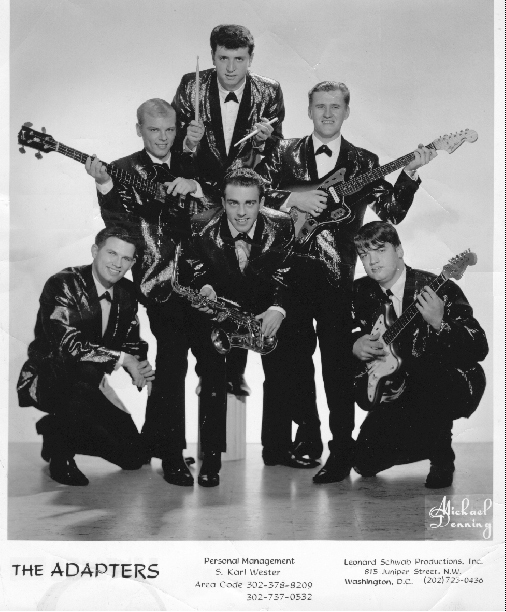The Adaptors

Welcome to the first chapter of Legends Of Newark Rock. Newark has a rich history of music that is on the verge of being forgotten. The intent of this series is to revisit Newark’s most notable bands from years long gone by. There is certainly no better group to kick off this series than:

Believe Me
Why
In 1963 Newark, the music scene consisted of a transistor radio tuned to 1380 on the AM dial, WAMS. Parading down Main Street & Delaware Avenue in a car full of your friends, hanging out at McDonald’s, and drag racing through the S bends and past the high school was about as exciting as it ever got. That summer, two Newark High kids, Carl Wester (bass) and Ron Hammer (drums, yes, Hammer is this drummer’s real name) decided to form a group. Wayne Ramsey (guitar) and Al Ament (lead vocals & keyboard) soon joined and they started picking up school dances and parties as The Adapters. Wayne left and was replaced briefly by Jan “Bozo” Osbourn, who was probably the only guy in town with long hair before the Beatles. As their popularity grew, Carl’s father, Whitey Wester, and Charles Kappauf became the group’s managers and arranged for them to play a regular block party in the parking lot of the old Newark Police station in the center of town.
By the summer of ’64, Paul Franklin had taken Bozo’s place on lead guitar. Al was also replaced by John Southard, a trained classical keyboardist, and Ed Stirling on lead vocals. With the new lineup, The Adapters quickly outgrew the weekly block party, and in the fall, management arranged to rent the new Aetna Fire Hall every Friday night. Around this time, Dave Roberts also joined at the rhythm guitar spot, bringing their numbers to six. Their repertoire consisted of the Top 40 hits of the day, which meant they needed to learn new material continually. And as a result, they had to emulate multiple styles, including healthy doses of British Invasion and Motown.
The Fire Hall Dance was immensely popular and was packed to capacity every week. It was THE place to be in Newark on Friday night and was viewed as a trouble spot by most parents. With an average of 600 in attendance at $1.00 a head, the members were bringing home an unheard-of $65 a man after expenses. Local record shark Vince Rago signed them for a record deal with his label, Richie Records, and in 1965 the single “Believe Me”/”Confess”, penned by lead singer Ed Stirling, was released. WAMS (Wilmington AM station) was overwhelmed with play requests, and the record shot to number 12 on the local Top 40. With a top 20 hit to their credit, doors opened at larger clubs in NJ and PA, and they became regulars at WAMS events.
In spite of these successes, Ed Stirling chose to take his Elvis styles and songwriting skills to another hard-working band, The Galaxies. As he was going in, Galaxies’ alto saxophonist & vocalist Bill Spots left and joined The Adapters. Another record deal with Montgomery Records gave them a Number 3 hit “Why”/ “Have Fun This Summer,” in 1966. A stunning vocal and Fender Jaguar solo by Franklin highlighted this screaming reverb-soaked plea that even reached number 16 in California. In response, the band appeared on Philly TV’s HyLitt and Jerry Blavat Shows. Booking was signed over to the Jolly Joyce Agency, whose far-reaching connections got them on the bill with Mitch Ryder & The Detroit Wheels, Gary Lewis & The Playboys, Freddie & The Dreamers, The Soul Survivors, and more. When the dust finally settled, “Why” had sold 10,000 copies.
The Adapters continued touring the east coast and as far as Chicago until 1968, when Paul & John moved to Rhode Island to form PF & The Flyers; Ron Hammer soon followed. PF carried the flame until the mid-nineties. Today Paul is still in Rhode Island; Ron & John returned to Newark. Ed Stirling is still singing locally and guests occasionally on WVUD.
Special thanks to Brian Lee, Ed Stirling, Ron Hammer, James Keesey, & Bullette for their contributions to this article.

Photo Left To Right:
John Southard, Carl Wester, Ron Hammer,
Bill Spots, Paul Franklin, & Dave Roberts. 1966.